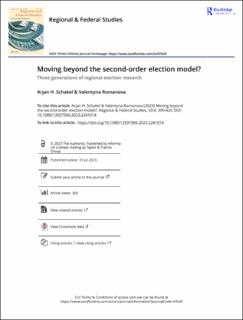Moving beyond the second-order election model?: Three generations of regional election research
Journal article, Peer reviewed
Published version

Åpne
Permanent lenke
https://hdl.handle.net/11250/3108623Utgivelsesdato
2023Metadata
Vis full innførselSamlinger
Sammendrag
In this introduction to the sixth annual review of regional elections we identify three generations of regional election studies that have applied the second-order election (SOE) model. First-generation literature finds that regional authority, territorial cleavages, and election (non-)simultaneity explain territorial heterogeneity in SOE-effects because they affect ‘what is at stake’ in a regional election. A ‘stake-based’ approach also underlies a second-generation literature that finds that voters with strong regional identities and who find regional government important are more likely to make distinct party choices in the regional electoral arena. Third-generation research adopts a multilevel electoral system perspective and considers the impact of political-institutional variables on the extent of horizontal and vertical top-down and bottom-up spill-over between regional and national electoral arenas. Four election articles and four election reports make important contributions to the three generations of literature and thereby reveal that these generations of regional election scholarship remain highly relevant.
